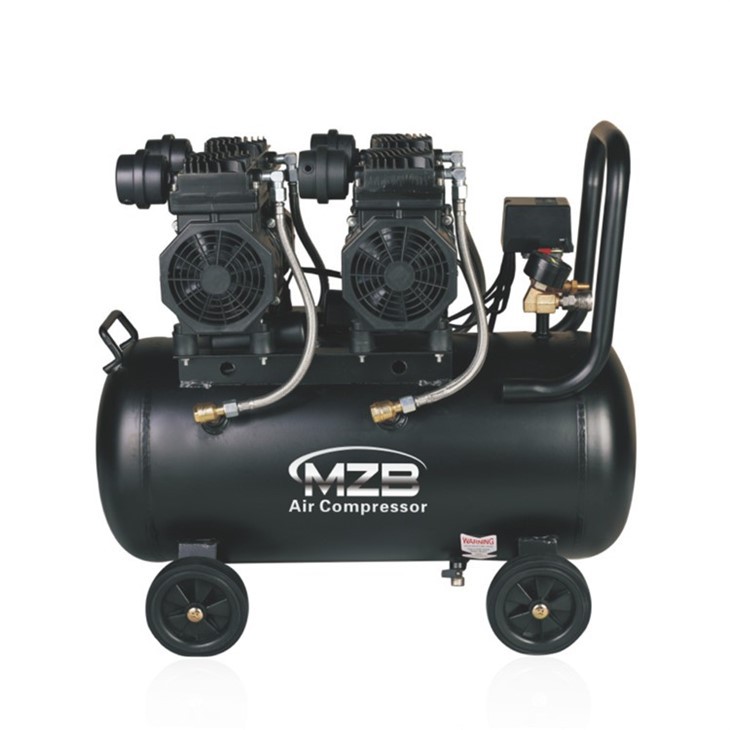Hey there! I'm a supplier of Quiet Dental Air Compressors, and today I wanna chat about something super important: the influence of air humidity on the operation of these compressors.
First off, let's talk about what air humidity is. Air humidity refers to the amount of water vapor present in the air. It can vary a lot depending on the weather, location, and time of day. In dental settings, the humidity levels can also be affected by things like the use of water in dental procedures and the ventilation in the clinic.
So, how does air humidity impact the operation of a quiet dental air compressor? Well, there are a few key ways.
1. Corrosion and Rust
High humidity means there's more water vapor in the air. When this moist air gets into the compressor, it can lead to corrosion and rust inside the compressor components. The metal parts, like the cylinders, valves, and pipes, are especially vulnerable. Over time, corrosion weakens these parts, which can lead to leaks, reduced efficiency, and even complete failure of the compressor. For example, if the valves start to corrode, they may not seal properly, causing air to leak out and reducing the compressor's ability to build up pressure.
2. Lubrication Issues
In some compressors, lubrication is crucial for smooth operation. However, high humidity can mess with the lubricating oil. The water vapor can mix with the oil, forming an emulsion. This emulsion doesn't lubricate as well as pure oil, which means there's more friction between the moving parts. Increased friction leads to more wear and tear on the components, shortening their lifespan. It can also cause the compressor to overheat, which is a big problem as it can damage the motor and other sensitive parts.
3. Air Quality
The air produced by the compressor is used in dental procedures, so its quality is of utmost importance. High humidity can lead to poor air quality. When the moist air is compressed, the water vapor condenses into liquid water. This water can carry contaminants, such as bacteria and dust, into the dental tools. Using tools with contaminated air can pose a risk to patients' health. For instance, water droplets in the air lines can create a breeding ground for bacteria, which can then be transferred to the patient's mouth during a dental procedure.
4. Efficiency and Performance
A compressor has to work harder to compress moist air compared to dry air. The water vapor in the air takes up space, so the compressor has to compress more volume to achieve the same amount of usable air. This means the compressor runs for longer periods and consumes more energy. As a result, the efficiency of the compressor drops, and your electricity bills go up. Also, the increased workload can cause the compressor to wear out faster, reducing its overall performance and reliability.


5. Freezing in Cold Conditions
In colder environments, high humidity can lead to freezing issues. When the moist air cools down inside the compressor or the air lines, the water vapor can freeze. Frozen water can block the air lines, preventing the proper flow of air to the dental tools. This can disrupt dental procedures and cause damage to the equipment.
Now, let's talk about how to deal with these humidity-related problems.
1. Use a Dryer
Installing an air dryer is one of the most effective ways to reduce the humidity in the compressed air. There are different types of dryers available, such as refrigerated dryers and desiccant dryers. Refrigerated dryers cool the air to condense the water vapor, which is then drained out. Desiccant dryers use a material that absorbs the water vapor from the air. Using a dryer helps keep the air dry, protecting the compressor from corrosion, improving lubrication, and ensuring better air quality.
2. Regular Maintenance
Regular maintenance is key to keeping your quiet dental air compressor in good shape, especially in high-humidity environments. This includes checking for signs of corrosion, changing the lubricating oil regularly, and cleaning or replacing the air filters. By catching and addressing problems early, you can prevent major breakdowns and extend the lifespan of the compressor.
3. Proper Ventilation
Good ventilation in the dental clinic can help control the humidity levels. Make sure there's enough fresh air circulation to remove the moist air. You can also use dehumidifiers in the compressor room to keep the humidity at an optimal level.
At our company, we offer a range of high-quality Quiet Dental Air Compressor that are designed to handle different humidity conditions. Our Oil Free Portable Air Compressor is a great option for clinics that need a compact and reliable compressor. It's oil-free, which means there's less risk of lubrication issues caused by humidity. And our 8 Bar High Pressure Oil Free Air Compressor provides high-pressure air for more demanding dental procedures.
If you're in the market for a quiet dental air compressor or have any questions about how to deal with humidity in your dental clinic, don't hesitate to reach out. We're here to help you find the best solution for your needs. Whether you're a small dental practice or a large clinic, we've got the right compressor for you. Contact us today to start a conversation about your dental air compressor requirements.
References
- ASHRAE Handbook - HVAC Systems and Equipment. American Society of Heating, Refrigerating and Air-Conditioning Engineers.
- Compressed Air and Gas Handbook. Ingersoll Rand.






